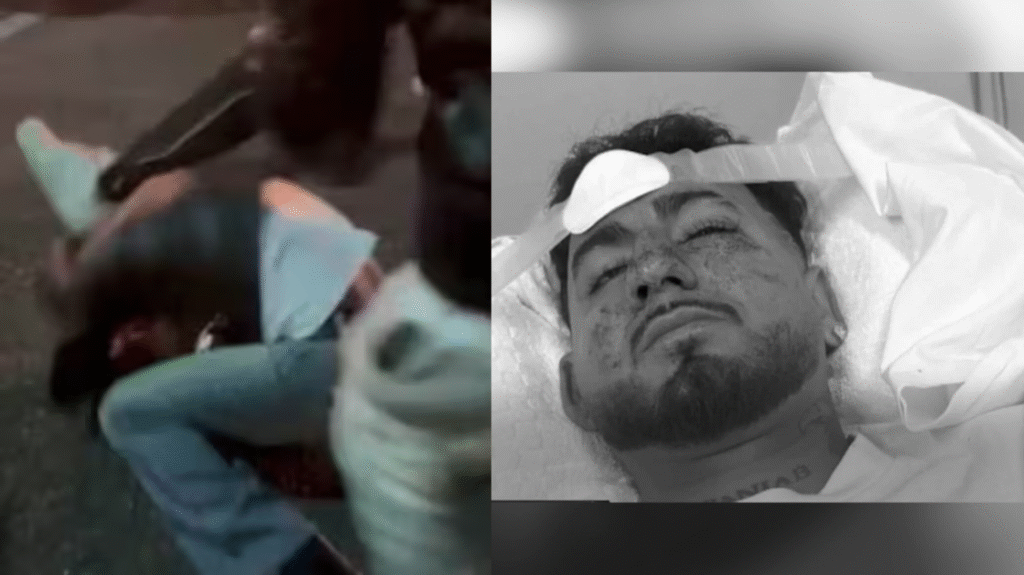In a shocking incident that has reverberated through Australia and India, 23-year-old Indian student Charanpreet Singh was violently attacked near Kintore Avenue, Adelaide, on July 19 during what initially appeared to be a parking dispute. However, this confrontation quickly escalated into a racially motivated assault, leaving Singh with severe injuries and a deeply shaken spirit.
🕒 What Happened That Night?
According to Charanpreet Singh’s account, he and his wife had stopped to enjoy Adelaide’s evening light displays when a group of five men approached their car, hurled racial slurs like “F‑off, Indian”, and immediately launched a brutal assault. Eyewitness footage showed the attackers using metal knuckles or sharp objects to punch and kick Singh relentlessly until he lost consciousness.
Emergency services rushed Charanpreet Singh—suffering from multiple facial fractures and brain trauma—to the Royal Adelaide Hospital, where he remains in critical care.
🚨 Arrest and Ongoing Investigation
South Australia Police immediately launched an investigation. A 20-year-old man from Enfield has been arrested and charged with assault causing harm, but the remaining four perpetrators are still at large. Authorities are reviewing CCTV footage and urging anyone with information to come forward.
🗣️ Charanpreet Singh’s Words from the Hospital
Even while hospitalized, Charanpreet Singh spoke with remarkable clarity and courage:
“They just said ‘f— off, Indian’, and after that they just started punching… I tried to fight back, but they beat me until I was unconscious.”
He shared his emotional distress:
“Things like this… make you feel like you should go back… You can change anything in your body, but you can’t change the colours.”
🌐 A Pattern of Racist Violence Abroad
This violent episode echoes a similar racist attack on an Indian IT professional in Dublin, where an immigrant faced assault and humiliation. The recurrence of such events highlights a disturbing trend: Indian nationals, especially students, are increasingly targeted in xenophobic or racially motivated incidents abroad, raising widespread alarm and concern.
👥 Community Outrage & Political Response
The attack has sparked deep outrage within Adelaide’s Indian community, with social media flooded with messages of support and demands for enhanced protection for foreigners.
South Australian Premier Peter Malinauskas condemned the incident, saying:
“Any time we see any evidence of any racial attack, it is completely unwelcome in our state and just not consistent with where the majority of our community are at.”
🔎 Legal Context and Next Steps
- Police probe underway: Reviewing surveillance footage, tracking assailants, and appealing to the public.
- Potential hate crime: The assault may fall under Australia’s legal definitions for racially aggravated violence, possibly resulting in enhanced penalties.
- Diplomatic involvement: Given the international significance, Indian diplomatic channels may offer consular support and raise the issue at governmental levels.
🧭 Why This Matters
- Safety of International Students – Such attacks highlight urgent concerns about the safety of foreign students in host countries.
- Cultural Vulnerability – Minor misunderstandings—like a parking dispute—can escalate dramatically into racial violence.
- Official Responsibility – Local governments and police forces must demonstrate they are prepared to prevent, investigate, and prosecute such hate incidents.
🧩 Lessons & Recommendations
- For Students: Ensure you’re familiar with local laws, carry emergency contacts, and avoid confrontations under any circumstances.
- For Authorities: Increase CCTV coverage, deploy officers in student neighborhoods, and run cultural awareness campaigns.
- For Communities: Build local support networks; university consulates and student bodies should offer robust protection and reporting mechanisms.
⚠️ A Call for Unity
The unrest in Adelaide sends a chilling message to Indians abroad: even everyday disagreements can become toxically racial. But Singh’s resilience and the swift arrest show that justice is possible, provided communities and authorities react decisively.
✅ Final Word
Charanpreet Singh’s attack was not a random act of violence—it was a hate crime. As he fights to recover, the world must join in the call for justice, stronger protections, and an end to racial violence.
If you’ve witnessed the attack near Kintore Avenue, Adelaide, please contact South Australia Police. Charanpreet Singh deserves justice—and no student anywhere should live in fear.
To read more Indian Laws and news, visit Legal Guide India



